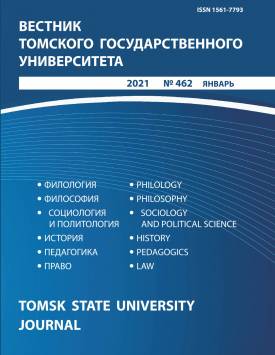The Speech Portrait of Russian-Speaking Schoolchildren in Latvia
The article presents an attempt of analyzing and summarizing the experience the author acquired over a number of years and which is connected with the problems of the Russian (L1, native) language acquisition by schoolchildren in Latvia. The author aims to describe the speech portrait of Russian-speaking schoolchildren in Latvia. The material presented in the article is based on the results of the author's long-term research. It includes: 1) Russian language textbooks (grades 4-9) development, testing and monitoring, 2007-2019; 2) project work which has been and still is focused on the analysis of Russian speech quality among university students and schoolchildren, 2008-2019; 3) research into the quality of writing skills of university students in Latvia (University of Latvia and RISEBA), 2013-2019; 4) the author's scholarly and methodological dialogue with the teachers of Russian in Latvia for more than twenty years. The author mainly focuses on several problems. Firstly, it is the analysis of the oral speech of schoolchildren and of the Russian verbal environment whose developing potential is not high enough for the successful development of a child's language personality. The natural Russian verbal environment (media language, everyday speech) often offers low-quality material. Secondly, the author carries out a special study of the quality of schoolchildren's writing skills as, according to scholars, it is written language, due to its specificity, that most vividly indicates the development of a language personality. Taking into account the results of the research, the author points out that there are many serious problems in the verbal behavior of most Russian-speaking schoolchildren. One of them is departures from linguistic norms at all linguistic system levels. The nature of these departures depends directly on the model of bilingual education that is implemented at schools children attend. The author pays attention to the problem areas of the schoolchildren's written language: 1) breaking of the spelling and punctuation rules of Russian; 2) confusion in speech of words and collocations belonging to different styles, lack of sense of style; 3) quality of written texts created by schoolchildren: problems with text structure; schoolchildren more often use explicit “I-communication” (reflective statements, texts with egocentric perspective), have a rather limited vocabulary; schoolchildren's essays contain very few intertextual inclusions, as a result, their texts seem very poor semantically; schoolchildren have no desire to express emotions in their writing (rational/pragmatic description of a problem, situation prevails). The author concludes that the development of a diaspora schoolchild's language personality in L1 (the Russian language) is not successful enough.
Keywords
speech portrait of schoolchildren,
bilingual education,
Russian-speaking schoolchild in diaspora,
verbal environment,
speech mistakeAuthors
| Gavrilina Margarita A. | University of Latvia | margarita.gavrilina@lu.lv |
Всего: 1
References
Competency based curriculum: Skola2030. Riga : IZM, 2018. URL: https://www.skola2030.lv/lv (дата обращения: 10.03.2020).
Караулов Ю.Н. Русский язык и языковая личность. М. : Наука, 1987. 263 с.
Асташова О.И. Речевой портрет политика как динамический феномен: дис.. канд. филол. наук. Екатеринбург, 2013. 245 с.
Мамаева С.В. Эффективное речевое общение (базовые компетенции). Словарь-справочник. Электронное издание / под ред. А.П. Сковородникова. 2-е изд., перераб. и доп. Красноярск : Сиб. фед. ун-т, 2014. С. 542.
Тарасенко Т.П. Языковая личность старшеклассника в аспекте ее речевых реализаций (на материале данных ассоциативного эксперимента и социолекта школьников Краснодара) : дис. … канд. филол. наук. Краснодар, 2007. 280 с. URL: http://www.disser-cat.com/content/yazykovaya-lichnost-starsheklassnika-v-aspekte-ee-rechevykh-realizatsii-na-materiale-dannykh (дата обращения: 09.02.2020).
Протасова Е.Ю. Как связаны многоязычие и среда // Многоязычие и среда / под ред. Е. Протасовой. Berlin : Retorika, 2017. C. 4-7.
Красных В.В. Когнитивная база vs культурное пространство в аспекте изучения языковой личности (к вопросу о русской концептосфере) // Язык, сознание, коммуникация / ред. В.В. Красных, А.И. Изотов. М. : Филология, 1997. Вып. 1. С. 128-144.
Млечко Т.П. Индивидуальное когнитивное пространство русской языковой личности в новом зарубежье // Русский язык за рубежом. 2012. № 1. С. 58-64.
Млечко Т. Русская языковая личность в социокультурном измерении новой диаспоры // Слово.ру: Балтийский акцент. 2012. № 2. С. 30-35.
Бурвикова Е.В. Русский язык в Новой Англии: опыт преподавания РКИ в университетах // Русский язык за рубежом. 2012. № 1. С. 116-120.
Джалалова А., Зорина Н., Костюкевич И., Протасова Е., Бурса А., Виимаранта Х., Гаврилина М., Григуле Л. Семейная языковая политика и двуязычное образование // Многоязычие и среда / под ред. Е. Протасовой. Berlin : Retorika, 2017. C. 8-45.
Ярошенко О.А. Штрихи к речевому портрету русского интеллигента // Вестник Иркутского государственного лингвистического университета. Серия: Филология. 2010. № 3 (11). С. 68-77.
Авина Н. Язык русской диаспоры: культурно-речевые проблемы (на материале Литвы) // Язык в движении: к 70-летию Л.П. Крысина / Отв. ред. Е.А. Земская, М.Л. Каленчук. М. : Языки славянской культуры, 2007. С. 9-19.
Земская Е.А. Речевой портрет эмигрантки первой волны (к вопросу об объяснительной силе теории естественной морфологии) // Русский язык сегодня / отв. ред. Л.П. Крысин. М. : Азбуковник, 2000. С. 100-121.
Hansen M.-B. The syntactic and semiotic status of direct quote, with reference to French // Transactions of the Philological Society. 2000. Vol. 98 (2). P. 281-322.
Dubinina I., Polinsky M. Russian in the US // Slavic Languages in Migration (Slavische Sprachgeschichte vol. 6), ed. Michael Moser and Maria Polinsky. Wien : Lit Verlag, 2011. URL: http://scholar.harvard.edu/mpolinsky/files/moser_english_final_edited_version.pdf (дата обращения: 12.02.2020).
Гац И.Ю. Лингвистическое образование школьников в современной языковой ситуации: моногр. М. : Изд-во МГОУ, 2012. 202 с.
Гаврилина М.А. Изучение русского (родного, первого) языка в школах Латвии. Rīga : Mācību grāmata, 2018. 192 с.
Bialystok E. Cognitive Effects of Bilingualism: How Linguistic Experience Leads to Cognitive Change // International journal of Bilingual education and bilingualism. 2007. Vol. 10, № 3. P. 210-223.
Schoonen R., van Gelderen A., Stoel R.D., Hulstijn J., de Glopper C. Modeling the Development of L1 and EFL Writing Proficiency of Secondary School Students // Language Learning. 2011. Vol. 61, № 1 (03). P. 31-79.
Gavrilina M.A. Speech behaviour of Latvian Russian-speaking schoolchildren in argumentative texts // Russian language studies. № 17 (4). Moscow : RUDN, 2019. P. 428-444. DOI: 10.22363/2618-8163-2019-17-4-428-444

